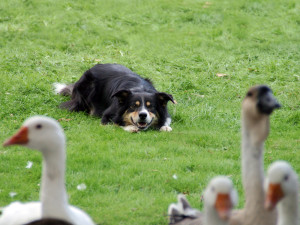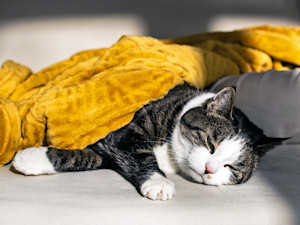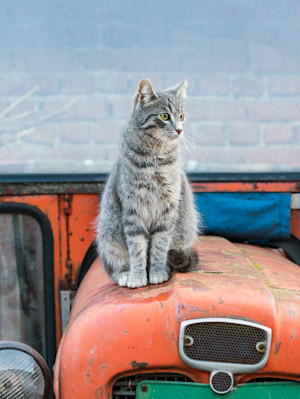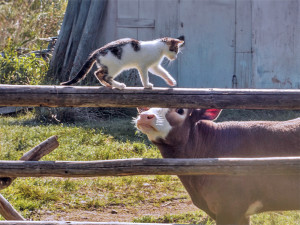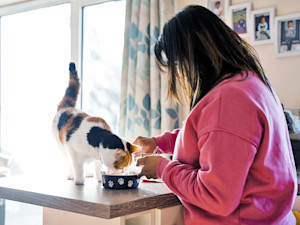Cats Should Be Kept Indoors to Avoid Bird Flu, Veterinarians Warn
The recommendation comes after multiple cats passed away from the virus.
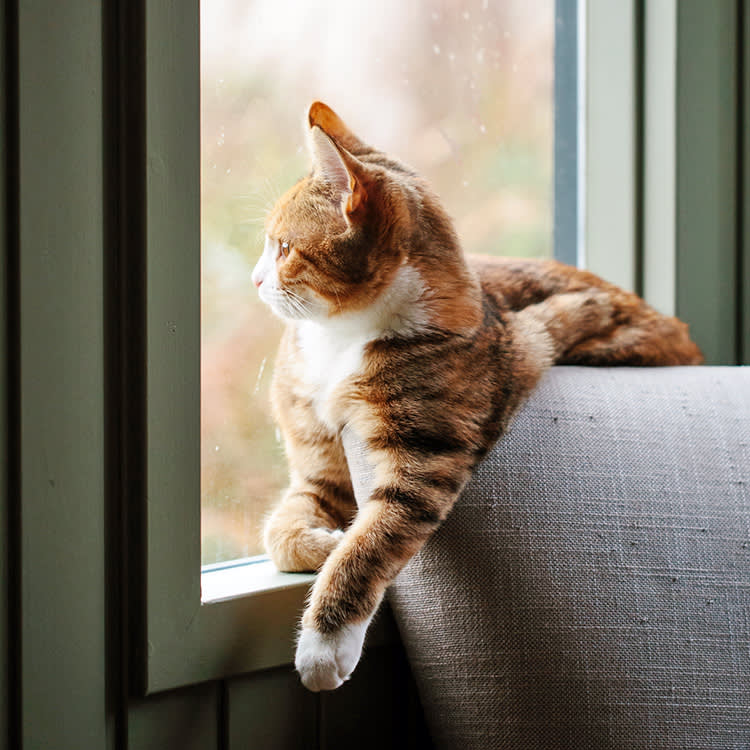
Share Article
In the past few months, stories about the spread of bird flu infections have been making headlines — with cats, thanks to their interest in hunting small prey, being more likely to catch the virus than dogs or humans. Domestic cats across the country have become sick with H5N1, including an uptick in cases in California. In an attempt to curb the spread of bird flu, veterinarians are recommending that pet parents keep their cats indoors.
New bird flu cases in cats
Recently, California has seen a rise in feline bird flu cases. The Los Angeles County Department of Public Health (LACDPH) has reported at least seven infections in pet cats; five of them have been confirmed to be linked to raw milk consumption. Two of the cats died after consuming raw milk, reported the University of Minnesota.opens in new tab
One of the cases is linked to a recent recall of Monarch Raw Pet Food,opens in new tab a raw food that tested positive for H5N1. “Four other house cats from the same household are presumed to have also been positive for H5 bird flu after consuming the product,” reported Los Angeles County Public Health (LAPH),opens in new tab though these four cases are not yet confirmed.
It is likely that additional, unconfirmed cases of bird flu in cats exist. “There have been multiple H5 bird flu probable and suspected cases in cats that either consumed raw pet food or raw milk and became acutely ill, but not all cats were able to be tested,” the LACDPH told the University of Minnesota.
Since the bird flu outbreak began in March 2024, dozens of cats have contracted H5N1, reports the American Veterinary Medical Association.opens in new tab In Texas, cats who were given milk from infected dairy cows fell ill, and several died. In Colorado, two indoor-only cats contracted bird flu. After a recent recall of Northwest Naturals raw cat food, a cat in Oregon died from the virus.
While the Centers for Disease Control findopens in new tab that the risk of bird flu to humans remains low, pet parents across the country should know how to keep their cats safe.
Veterinarian recommendations
The Los Angeles County Department of Public Health recommends that cats are not fed raw meat, raw poultry, or raw milk; the process of cooking meat and pasteurizing milk kills the virus.
Veterinarians at Elliott Bay Animal Hospital in Seattle add that cats should be kept indoors to limit their exposure to wildlife. “The disease can be transmitted by being around an infected bird, finding a dead bird and eating that or touching it,” veterinarian Dr. Heather Weihl told KING 5 News.opens in new tab “We just need to eliminate exposure — that’s the best way to keep the disease under control right now.”
Symptoms of bird flu in cats include fever, loss of appetite, tremors, seizures, coughing, and several more neurologic and respiratory signs, the American Veterinary Medical Association explains.opens in new tab If you suspect your cat has bird flu, they should receive veterinary care immediately. You can protect yourself by avoiding direct contact with an infected cat, regularly washing your hands, avoiding exposure to wild birds, thoroughly cooking meat, and consuming only pasteurized milk.

Sio Hornbuckle
Sio Hornbuckle is the Assistant Editor at Kinship, where they frequently write for the site. As a writer, they specialize in pet news, animal science, and pop culture. They live in New York City with their cat, Toni Collette.
Related articles
![Dog on ground looking at geese]()
What to Know About Bird Flu in Cats and Dogs
Several cats and one dog in North America have died of the virus. Here’s how to keep them safe.
![Cat sleeping at home in the sun.]()
Bird Flu Is Infecting Cats Across The Country—Including Indoor Ones
Nearly 40 domestic cats have been infected with bird flu—two of which have never been outside.
![Outdoor cat sits on a tractor outside.]()
Cats May Become Bird Flu Carriers, New Study Warns
With bird flu cases on the rise, scientists are worried the virus could mutate.
![Calf looking up at a cat on a farm.]()
Cats Who Consumed Raw Milk Died From Bird Flu, Reports the CDC
Unpasteurized milk can transmit avian influenza from cows to mammals.
![Woman feeding her cat in the kitchen at home.]()
5 Cats Have Reportedly Been Infected with Bird Flu from Raw-Food Brand
Here’s everything you need to know.
